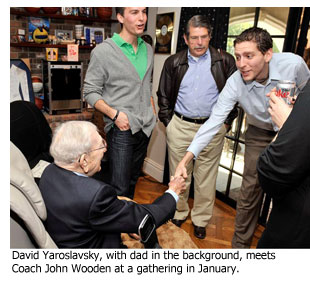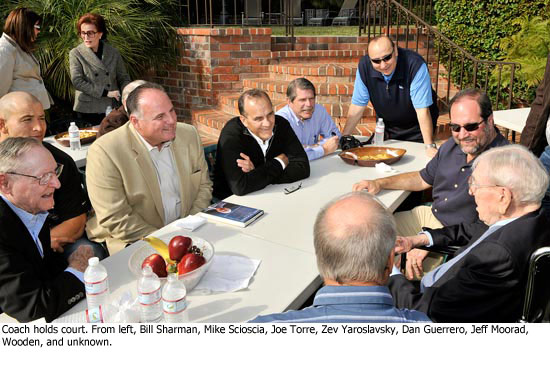John Wooden remembered
June 8, 2010
I consider it one of the greatest privileges of my life that, over the years, I was able to share quality time with UCLA Coach John Wooden. Coach, as we all called him, died last Friday night, only months shy of his 100th birthday. He was as influential a teacher and life coach as I’ve ever met.
I first encountered Wooden when I was a UCLA student. In 1970, as the campus was roiled in protest, I passed by the Royce Hall steps and saw a peaceful and intently engaged crowd gathered around him. I stopped and listened as they talked basketball, politics and academics. What was striking about the scene was the serenity of the crowd. Without knowing it, Wooden had brought a sense of calm to the turbulent campus and to all of us who hung on his words. When he headed toward Pauley Pavilion, I shook his hand and went about my business at the Research Library.
I didn’t meet Coach again for several years, not until I’d been elected to the City Council. I had invited him to City Hall to present him with a resolution after he retired from coaching. The signed picture of that ceremony still hangs proudly in my office.
Back then, I still viewed him mostly as a sports hero of epic proportions. But that would change when, many years later, I got the opportunity to know Coach Wooden, the person. Thanks to mutual friends and UCLA classmates, I found myself one night having dinner with him. We talked about his life and his philosophy and a bit about sports. One dinner led to another, and over the years, I must have spent a couple dozen afternoons and evenings in his presence.
The more I got to know him, the more I came to understand that the world view he offered was far more profound than any national championship—even 10 of them. I bought all of his books and read them religiously. I discussed his writings with him and listened intently to his soft spoken but powerful story-telling of his life experiences. Always, it was about the lasting things in life—values, philosophy, Shakespeare, the Bible and the countless poets whose prose he could recite from memory, even in his 99th year.
A bunch of us who were associated with UCLA would take him out to dinner around his birthday every year at the Valley Inn in Sherman Oaks, one of his favorite haunts. For the last many years, it was a standing appointment on my calendar. Nothing, absolutely nothing, would get in the way of that dinner. The attendees included people with whom Wooden had a decades-long relationship (how I got into that group is beyond me, but I never asked questions). His friends included former UCLA Chancellor Charles Young, former football coach Terry Donahue, former Athletic Director Pete Dalis and several others.
This was a group of pretty accomplished individuals with healthy egos and resumes. Stories abounded at these dinners as each member of the group regaled Wooden with reminiscences of their times together. Generally, Coach just listened. But once in a while he’d choose to speak. When that happened, this group of powerful and influential friends would fall silent—one and all, a dozen or more of us. It was not only a sign of respect, but also a genuine desire to harvest the wisdom from his words.
During one of those dinners, Wooden quoted from a poem that one of his former players, retired Vice-Chancellor Pete Blackman, wrote around 1960. It recounted a road trip the Bruins had taken to Houston. When the team arrived at the motel, the check-in clerk advised Wooden that there were rooms reserved for the white members of the team but that the black members would be sleeping in a place reserved for them in the basement.
The players and Coach Wooden huddled and decided they’d all leave the motel and find someplace else that night, even though there was no guarantee they’d be able to find any place that would take all of them in—black and white. Blackman’s poem memorialized that night. I don’t remember the verse but, 45-years-later, Wooden did, reciting it to us without missing a beat or skipping a word. It gave us chills, one of those moments none of us will ever forget.
 Last January, the last time I saw Coach, my friend Angelo Mazzone was hosting a brunch at his home for Wooden. The guest list was very limited. It included many of Wooden’s family members, along with Joe Torre, Mike Scioscia, Bill Sharman, Vin Scully and a few others. What ensued were several hours that I only wish we had videotaped. There was Wooden, physically frail but mentally sharp, sitting across from Dodgers’ manager Torre and Angels’ manager Scioscia, who were exchanging stories about their experiences in baseball and as life coaches. (Wooden loved baseball and had a great baseball mind. In fact, around 1970, the Pittsburgh Pirates asked him to be their manager, an offer he respectfully declined).
Last January, the last time I saw Coach, my friend Angelo Mazzone was hosting a brunch at his home for Wooden. The guest list was very limited. It included many of Wooden’s family members, along with Joe Torre, Mike Scioscia, Bill Sharman, Vin Scully and a few others. What ensued were several hours that I only wish we had videotaped. There was Wooden, physically frail but mentally sharp, sitting across from Dodgers’ manager Torre and Angels’ manager Scioscia, who were exchanging stories about their experiences in baseball and as life coaches. (Wooden loved baseball and had a great baseball mind. In fact, around 1970, the Pittsburgh Pirates asked him to be their manager, an offer he respectfully declined).
Again, like those of us at the Valley Inn, Torre and Scioscia were in awe of Wooden. They asked if he had ever seen Babe Ruth or Lou Gherig play, or whether he had ever met Dizzy Dean or Joe DiMaggio. These highly accomplished men behaved like kids with a chance to chat with their hero and get a glimpse of history. But they, too, knew he was bigger than sports, coaxing him into imparting words that they might carry into their own futures.
I sat at the table just taking it all in, feeling blessed for the extraordinary opportunity. I had brought my grown son with me knowing that this might be the only chance he’d have to spend any kind of meaningful time with Wooden. David didn’t squander the opportunity. He asked Wooden the name of his favorite book. “The Bible,” Wooden responded. My son then asked the name of his next favorite book. “Many of the books written about Abraham Lincoln,” Wooden said. “I’ve always been interested in Lincoln.”
Indeed, Wooden often cited one of Lincoln’s quotes: “Most anyone can stand adversity, but to test a person’s character, give them power.” That gave us all food for thought.
What has been so interesting about the passing of John Wooden is the amount of attention given to his philosophy of life and his role as a teacher and life coach. We’ve heard this from his players, his associates, his family and his friends. It’s worth noting that while Wooden coached at UCLA for 28 years, he has been retired for 35 years, time he certainly didn’t waste. He lectured and wrote. He spoke to school assemblies and charitable organizations. He rarely turned down a speaking invitation and never refused an autograph request.
Coach Wooden never wore his philosophy on his sleeve. He simply lived it. That is what I’ll remember most about him and that is what will endure of his life. In the last few days I’ve reviewed many of Wooden’s philosophies, and I’ll close by sharing some that most resonate with me:
- “Ability gets you to the top; character keeps you there.”
- “Character is more important than reputation, because reputation is merely what other people think of you; character is what you really are, and only you know what that is.”
- “Failure is not fatal, but failure to change might be.”
- “You are your word. Don’t give your word unless you intend to keep it. A leader whose promise means everything is trusted.”
- “The star of every successful team is the team. Individuals don’t win games, teams do.”
- “The purpose of criticism is to correct, improve and change. It is not to humiliate, demean, or punish.”
- “Don’t confuse activity with achievement.”
- “Favor firm suggestions over strict rules.”
- “Practice doesn’t make perfect; perfect practice does.”
- Great leaders give credit to others, but accept the blame themselves.”
Rest in peace Coach John Wooden.
Posted 6/8/2010














 405 bridge work causes a stink
405 bridge work causes a stink





